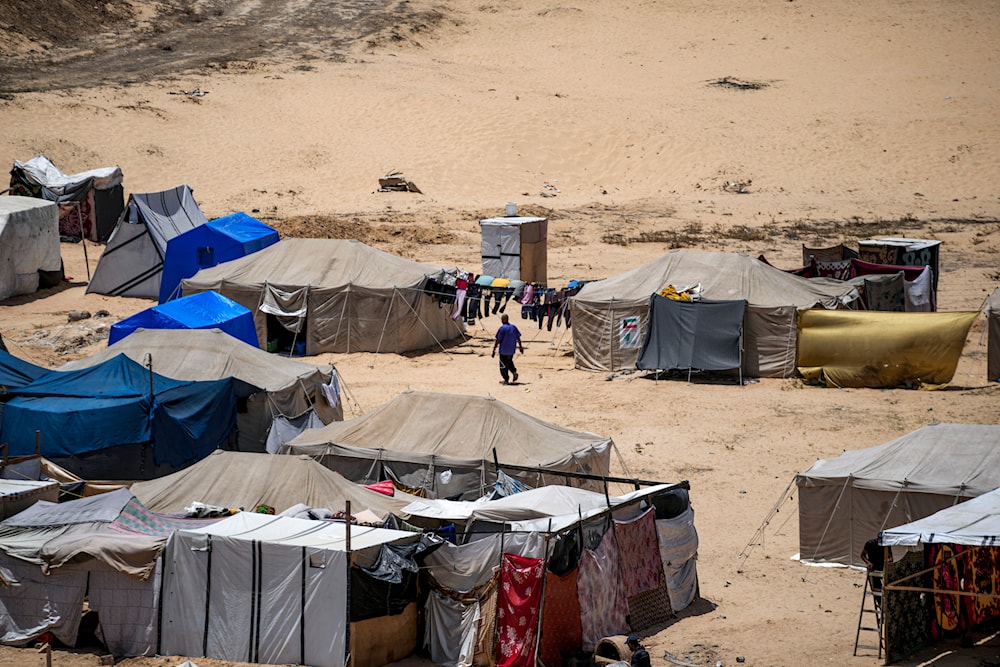'Israel' weaponizing water against Palestine since 1993: Oxfam
The Israeli occupation is weaponizing water against Palestinians, particularly in Gaza, and especially in light of the ongoing aggression on the Strip.
-

A Palestinian man displaced by the Israeli bombardment of the Gaza Strip walks at a makeshift tent camp in Khan Younis, southern Gaza Strip, July 4, 2024. (AP)
International humanitarian organization Oxfam strongly criticized the Israeli occupation for employing water deprivation as a method of warfare against the civilian population in the Gaza Strip.
In a new report published on Thursday, Oxfam condemned what it described as a systematic and deliberate tactic that violates international law and constitutes a blatant disregard for human life.
The report highlights that since the 1993 Oslo Accords, the Israeli occupation has utilized water deprivation to "dehumanize and ultimately threaten Palestinian lives."
The near-total destruction of Gaza's water and sanitation infrastructure by Israeli military actions has, according to Oxfam, significantly contributed to causing and exacerbating the dire living conditions in the blockaded Strip.
Key findings of the report indicate that the water supply in Gaza has been slashed by 94%, leaving residents with less than five liters of water per person per day - far below the minimum emergency threshold recommended by international standards.
"Israel's actions have deprived the entire population of Gaza of life-saving water and sanitation services, creating unavoidable immediate and long-term threats to people's health and survival," the report stated.
The lack of clean water and sanitation has led to a quarter of Gaza's population suffering from preventable diseases.
Cutting off external water supplies
Oxfam also accused the Israeli occupation of exacerbating the water crisis by cutting off external water supplies, destroying water facilities, and deliberately obstructing aid efforts aimed at helping Palestinians in Gaza.
The report mentioned that five water infrastructure sites have been damaged every three days since the onset of the Israeli aggression on Gaza.
The humanitarian situation has been further compounded by continuous bombardments, which have obliterated the capacity of humanitarian actors to provide essential emergency services.
The Israeli occupation forces have destroyed 70% of all sewage pumps and 100% of wastewater treatment plants, which resulted in widespread sewage contamination, posing severe health risks to the people of Gaza.
Oxfam has called on the Israeli occupation to lift the blockade on Gaza and facilitate unhindered access to humanitarian aid, including food, clean water, sanitation, and shelter.
The organization also urged the international community to take decisive action to uphold justice and human rights, prevent further suffering, and protect the rights of Palestinians as enshrined in the Geneva and Genocide Conventions.
Gaza camps suffering the most
In a Gaza camp, Umm Nahed Abu Shar's daily meals are marred by the overwhelming stench of sewage, an increasingly hazardous problem exacerbated by the ongoing war on Gaza.
The situation is a stark representation of the broader humanitarian crisis in the Gaza Strip, where hundreds of thousands of tons of uncollected waste and war debris are accumulating.
A report released on Thursday by a European activist group highlighted the dire conditions, warning that the crisis could soon affect neighboring regions.
In Deir el-Balah, a central Gazan city, authorities have announced that wastewater treatment plants have shut down due to a fuel shortage. Abu Shar and her family, living in a tent, face unbearable conditions as summer temperatures soar.
"We are just suffering; we are not living," Abu Shar told AFP. "The heat, the diseases, the flies, the mosquitoes and their hissing, it all hurts us."
The unbearable smell of sewage prevents Abu Shar and her children from sleeping, as they continually fall ill from diseases spread by the waste.
Doctors report a surge in cases of lice, scabies, chickenpox, and skin rashes, compounding the widespread hunger that has plagued Gaza since the conflict began on October 7.
UN agencies have repeatedly warned of the potential for cholera and other deadly diseases to spread rapidly, emphasizing the urgent need for humanitarian intervention.

 4 Min Read
4 Min Read








